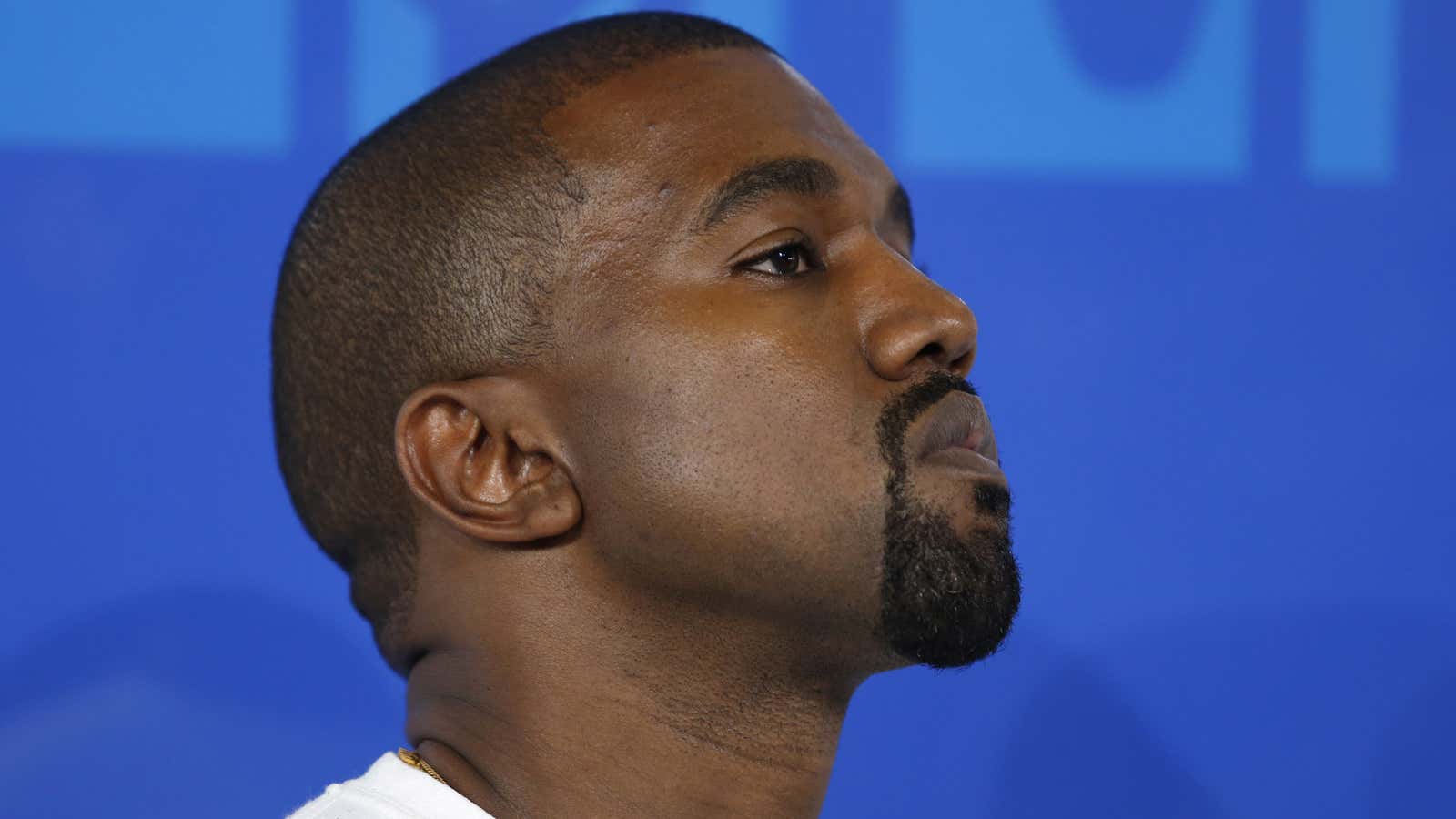It’s a logical fallacy to assume that, just because x implies y, y therefore also implies x. For example, all great philosophers may be geniuses, but that certainly doesn’t imply that all geniuses are great philosophers. Kanye West is a case in point.
Though his recent comments on slavery are offensive and shallow at best, Kanye has shown musical and marketing brilliance throughout his career. In his latest high-profile act of creativity, Kanye announced that he was writing a philosophy book in real time on Twitter. In quintessentially grandiose style, Kanye made this transition into a new and complex field without a shred of self-doubt.
Many of his tweets following the announcement certainly have a philosophical sheen:
Academic philosophers, though, are unimpressed.
Kanye’s tweets are “superficial,” writes Luvell Anderson, philosophy professor at University of Memphis in an email. “They’re so banal or trite that they can mean almost anything and nothing at the same time.”
Elliot Knuths, a law degree candidate at Northwestern University who’s written several academic philosophy papers, agrees that Kanye’s tweets are not “philosophically significant,” and are unsupported by rational arguments.
“They may indeed inspire contemplation in his readers, but not every mental exercise is philosophy,” says Knuths. Short, loosely linked aphorisms can be a format for philosophy, but Kanye’s efforts don’t have the necessary rigor. “They lack the requisite premise -> argument -> conclusion structure and thus seem prematurely conclusory,” Knuths says. “I am inclined to treat the recent tweets as opinions, albeit ones arrived at through philosophizing, rather than instances of philosophizing itself.”
What does philosophy have that Kanye’s tweets lack? For one thing, philosophy is founded on clear logic and specific claims. Tweets such as the ones below lack the reasoning and originality to be truly philosophical, says Ian Olasov, philosophy graduate student at City University of New York and organizer of Brooklyn Public Philosophers, a forum where academic philosophers give lectures for a general audience.
“When he’s talking about consciousness, he’s clearly talking about some kind of prevailing ideology or conventional wisdom. But what sort of ideology or convention does he have in mind? I have no idea,” says Olasov. “’Be here now’, ‘do what you feel not what you think’, and ‘do things you love’ are banalities. I mean, there’s nothing necessarily wrong with a banal piece of advice—it could be good advice, even if it’s very familiar.” It’s just not philosophy.
“Part of why Kanye’s tweets are so vacuous is that, by his own admission, he doesn’t read,” says Olasov. Many of the ideas Kanye references have been discussed more thoroughly by philosophers. Living in the present? Try MIT philosopher Kieran Setiya. Columbia philosopher Elliot Paul has compelling work on creativity, while Nina Strohminger, Josh Knobe, and Chandra Sripada are just a few contemporary philosophers wrestling with the question of authenticity (and arriving at different conclusions), says Olasov. Meanwhile, philosophical texts that grapple with the impact of ideology include the debate between Socrates and Thrasymachus in Plato’s Republic, Nietzsche’s discussion of slave morality in The Genealogy of Morals, Marx and Engels in The German Ideology, Susan Okin in Justice, Gender, and the Family, and Tommie Shelby in “Ideology, Racism, and Critical Social Theory.”
Justin Weinberg, philosophy professor of University of South Carolina and editor of the DailyNous philosophy blog, says Kanye attempting to write a book on philosophy is no different than the rapper trying to write on physics or constitutional law. “Philosophy is complicated—arguably one of its central tasks is to show how everything is more complicated than it might at first appear—and it takes time and effort and practice to develop the knowledge and skills to do it well,” Weinberg writes in an email. “You sometimes hear that ‘anyone can do philosophy.’ If that’s true, it is true in the same way that ‘anyone can rap’ is true.”
Still, perhaps Kanye’s mere mention of philosophy will spark interest in the subject, which could ultimately benefit both those who read philosophy and academic philosophy departments, notes Weinberg.
And Knuths adds that there’s hope for Kanye yet: Perhaps his complete book will be more profound than a collection of tweets. “Let’s wait until he’s had a real opportunity to prove his point(s) in his forthcoming Break the Simulation before deciding whether to add him into Raphael’s School of Athens,” he adds.
